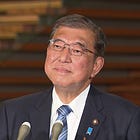Troubles at home and abroad | This week in Japanese politics
Government and opposition parties adapt to the post-general election balance of power, while the Ishiba government prepares for the new US administration
Thank you for reading Observing Japan. “This Week in Japanese Politics” is published on Friday or Saturday for paid subscribers.
If you are looking for timely, forward-looking analysis of the stories in Japans’s politics and policymaking that move markets, I have launched a new service through my business, Japan Foresight LLC. For more information about Japan Foresight’s services or for information on how to sign up for a trial or schedule a briefing, please visit our website or reach out to me.
Japan Foresight clients received the following notes:
"What a second Trump administration could mean for Japan,” 6 November 2024
“The Japanese political system enters a new era,” 8 November 2024
In case you missed it, I also wrote about Japan’s response to the US presidential election here:
The rundown
New political arrangements are taking shape as the Liberal Democratic Party (LDP) made a major institutional concession to the Constitutional Democratic Party (CDP) and has entered into negotiations with the Democratic Party for the People (DPFP) on securing its support for government budgets. LDP backbenchers are unhappy with Prime Minister Ishiba Shigeru but the party’s unity is holding for now, while Kōmeitō chose a new leader and Ishin no Kai will select a new leader on 1 December. Meanwhile, the government reported that wages and consumption fell again in September, and in foreign policy, Ishiba spoke with US President-elect Donald Trump — who Ishiba hopes to meet later this month — while his national security adviser went to Beijing to prepare for a possible meeting between Ishiba and Chinese President Xi Jinping.
Politics
While the outcome does not seem in doubt, the House of Representatives appears to be headed for its fifth-ever run-off in a vote to select the prime minister on Monday, 11 November, the first since the 1994 vote that yielded the Murayama government. With the Democratic Party for the People (DPFP) and possible also Ishin no Kai preparing to vote for their own leaders in the second round, thereby invalidating their votes and lowering the bar for winning a majority, Prime Minister Ishiba Shigeru will likely win; on Sunday, 3 November, Constitutional Democratic Party (CDP) Secretary-General Ogawa Junya criticized the other opposition parties for not taking their duties seriously.
With several members of the Ishiba government having lost their seats in the general election, the prime minister is preparing to name replacements after the Diet votes to select a prime minister. Suzuki Keisuke is likely to succeed Makihara Hideki as justice minister; Etō Taku, a former agriculture minister, could replace the defeated Ozato Yasuhiro.

The LDP held a post-mortem on the general election on 7 November, with more than 200 in attendance and running for more than three hours. While there were some calls for Ishiba to take responsibility for the electoral defeat and resign, there was no organized push to oust the prime minister in the immediate term, though there was significant concerns about the risk of having Ishiba lead the party into upper house elections next year. Takaichi Sanae, de facto leader of the anti-Ishiba forces, did not attend the 7 November session but told allies in a meeting on 5 November that now is not the time to oppose Ishiba, a message she reiterated in a tweet on 9 November, when she called for party unity in the 11 November vote for prime minister, warning that a divided LDP will only result in a CDP-led government.
Keep reading with a 7-day free trial
Subscribe to Observing Japan to keep reading this post and get 7 days of free access to the full post archives.




